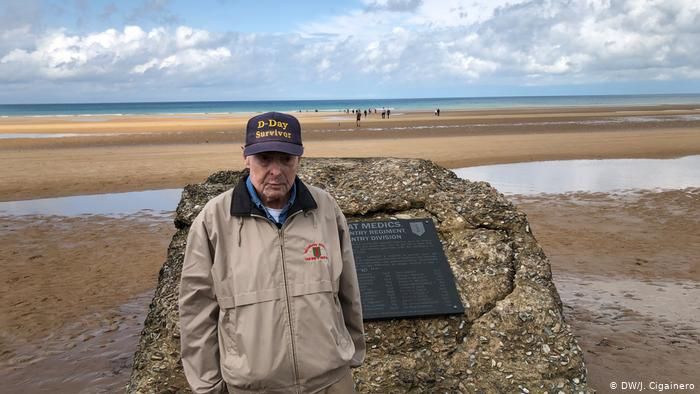On Omaha Beach in Normandy, a solitary crag of concrete sits in the sand. The town of Colleville-sur-Mer, just above the beach, recently gave it the name Ray's Rock, after US Army WWII veteran Ray Lambert. The medic used the boulder to cover his wounded men from German gunfire 75 years ago during the onslaught of the D-Day landings that liberated Normandy and turned the tide of the war.
Last year, the town, which is home to the American cemetery, put a plaque on the rock with Lambert's nameand those of his fellow medics."I can come here and see my men and I know that they are being remembered. Their names are here permanently now," Lambert said standing in front of the monument (pictured above). "Those guys my age today, so many of them are gone."
Lambert has come back over the years to speak at memorial ceremonies, and he has come alone, he said, "to just stand out here and look at the Channel and remember my men."

At 98 years old, Lambert said this is the last time he will come to Normandy. Growing up in in rural Alabama, Lambert and his brother Bill both signed up for the US Army. They were thrust into the thick of combat, fighting in North Africa in 1943 and later in Sicily. Ray Lambert was wounded in both assaults and awarded the Silver Star for bravery.
Then the brothers faced the Omaha Beach bloodbath together on D-Day, June 6, 1944. "We could hear the bullets on the ramps like hail, so we knew when the ramp went down bullets would come in and kill some of our guys, but we didn't know who," Lambert said.
As soon as the hatch opened, Lambert said something — gunfire or artillery — shattered his elbow. He dove underwater and made it to the beach where he was even more exposed as he tried to help his wounded comrades.
"There was nothing to get them behind for protection, so I was looking around and saw this rock and told my men we'd have to get those guys behind this rock," Lambert said.
Lambert and his team of medics continued dashing back into the line of fire to drag wounded soldiers behind the hunk of concrete, even as Lambert was gravely wounded again in the leg. He woke up later in a military hospital next to his brother, who had also been wounded.
Between June and August 1944, about 225,000 service members in total were killed, wounded or went missing in the Operation Overlord invasion of Normandy.
Lambert's brother Bill died in 2010. Even though they lived through three invasions together, he says they didn't discuss the war among themselves much when it was over. Lambert, like many WWII veterans, also didn't recount his experiences to others.
"Then I realized that if I didn't tell these stories about my men, that they couldn't do it," Lambert said. "I felt it was my responsibility and obligation to tell people about the war and what they did."
Now, Ray's Rock will stand in remembrance of Lambert and his brave medics long after he is gone, as well as his newly published memoir about that gruesome day, "Every Man a Hero."










